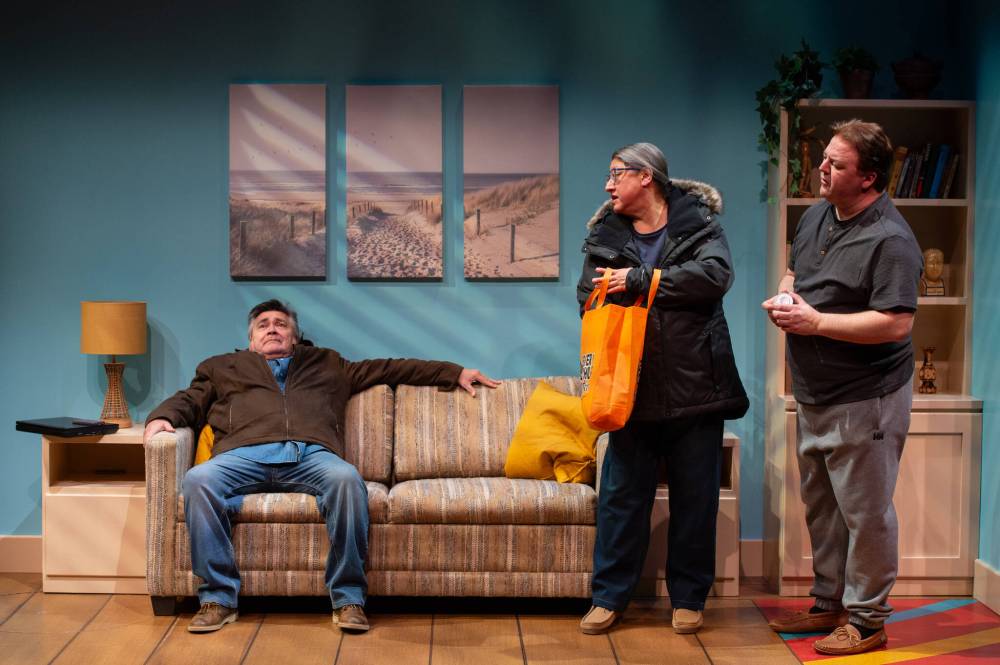Laughing through familial, colonial conflicts
Theatre season closes with funny, poignant world premiere about cultures colliding
Advertisement
Read this article for free:
or
Already have an account? Log in here »
To continue reading, please subscribe:
Monthly Digital Subscription
$19 $0 for the first 4 weeks*
- Enjoy unlimited reading on winnipegfreepress.com
- Read the E-Edition, our digital replica newspaper
- Access News Break, our award-winning app
- Play interactive puzzles
*No charge for 4 weeks then billed as $19 every four weeks (new subscribers and qualified returning subscribers only). Cancel anytime.
Read unlimited articles for free today:
or
Already have an account? Log in here »
The Comeback, the final play of the 2023-2024 season at Royal Manitoba Theatre Centre, is as funny as it is winkingly self-aware, immediately establishing a perceptive overview of its characters, its audience, its venue and the historical context of the story about to unfold.
Usually, an opening-night production begins with a land acknowledgment. Instead, that statement of territorial gratitude is brilliantly satirized, roughened and teased apart by the production’s central protagonist, a Métis wannabe playwright named Adam Goulet (a warm, welcoming Cory Wojcik). “I acknowledge the land was stolen,” he says. “You acknowledge the attempted erasure…”
Theatre review
The Comeback
Royal Manitoba Theatre Centre
John Hirsch Mainstage
To May 18
★★★★ out of five
Capped off by Goulet asking the stage manager to “send on the whites” — Melanie Whyte and Mariam Bernstein are game as ever — it’s likely the funniest land acknowledgement ever performed, and as the first major risk in a two-act comedy (two hours-plus with intermission), it pays off immensely.
In fictionalizing and mocking themselves and their immediate families in equal measure, playwrights Trish Cooper and Sam Vint know exactly what they’re doing.
Cooper and Vint, a married couple, write themselves into two semi-invented characters who only begin to make sense when contrasted with the other. There’s Goulet, a man, like Vint, coming to terms with his Métis identity and all its inherited baggage, and there’s the settler, church-raised Jesse, played by Gwendolyn Collins with a delightful admixture of earned frustration and awkward silliness.
DYLAN HEWLETT PHOTO From left: Michael Lawrenchuk, Marsha Knight and Cory Wojcik deliver punchlines and poignancy in The Comeback.
When Jesse and Adam get together, Adam sleeps through a noon flight, an act of lethargy he describes as shameful. A minute later, he is quoting Louis Riel’s famous speech: “My people will sleep for 100 years, and when they wake, it will be the artists who give them back their souls.”
What a weight to bear for a generation of artists who, for the first time in Manitoban history, are truly able to share their stories on the largest stages. Vint and Cooper comment on this with patience and respect, most pointedly when Goulet — a descendent of Elzéar Goulet, a Métis leader murdered in 1870 — addresses it himself during a folkish soliloquy. “Recently, my Indigeneity became important, so important that I got to write this play,” he says during one aside that allows the audience into the writer’s mind.
So what happens when the crests of two familial waves — one settler, one Métis — make contact? A domestic comedy about where we live, have lived and will live, less a melting pot than a whistling teakettle on a red-hot burner.
DYLAN HEWLETT PHOTO From left: Melanie Whyte, Marsha Knight, Gwendolyn Collins and Cory Wojcik play a family for whom living, loving and laughing come with some degree of difficulty.
In the lead roles, Wojcik and Collins nail the script’s wisely observed humour. For Collins, that’s especially true when she goes on a much-deserved rant about her infected post-partum nipples, or when she moves her body like a seizing marionette during a smudging ceremony. Wojcik’s highlights often come during his character’s direct addresses, including one defending the virtues of seven-layered vinarterta and one complaining about the lameness of his spirit name, Buffalo Man.
Adam and Jesse are particular and persnickety, especially when they’re in the company of their dysfunctional families. However, if there is one element that needs greater emphasis, it’s overt romance; even a kiss on the forehead would go a long way.
Fortunately, the main characters are supported by a network of imperfect relatives, a category of individuals defined less by blood than constant presence. Jesse’s mother Carol (Whyte, not wasting one moment) is often deployed as a reflection of good-natured white settler unawareness.
There’s also Adam’s sweet-natured “Auntie” Leona (Tracey Nepinak, excellent), whose affection knows no boundaries. The first time she meets Jesse and the newborn baby Finn, she practically nestles herself in Jesse’s armpit as she breastfeeds.
Michael Lawrenchuk’s Uncle Bear is an unpredictable wonder, the type to scream “Jaws” while a character acts out a six-word movie title during a round of charades.
Bernstein is a willing jester, but one with layers, as revealed during a heated argument with the production’s most complex character, Adam’s mother, Lynn (Marsha Knight). With a long face and a longer flannel shirt, Lynn is tough, from a generation hardened by the ‘60s Scoop and slowly allowing themselves the benefit of self-forgiveness.
Knight delivers her lines with a piercing directness that sometimes seems out of rhythm with her castmates. However, this works as a depiction of the generational and cross-cultural communication challenges inherent to the play’s central tension, tightened by Cooper and Vint as the characters reach a cathartic endpoint of shared understanding.
Some might say there’s nothing funny to be found within the family history and trauma that inspired Vint and Cooper to write this play. The writers would likely disagree, and so would this reviewer, as long as the joke is as well-told as The Comeback.
ben.waldman@winnipegfreepress.com

Ben Waldman
Reporter
Ben Waldman covers a little bit of everything for the Free Press.



